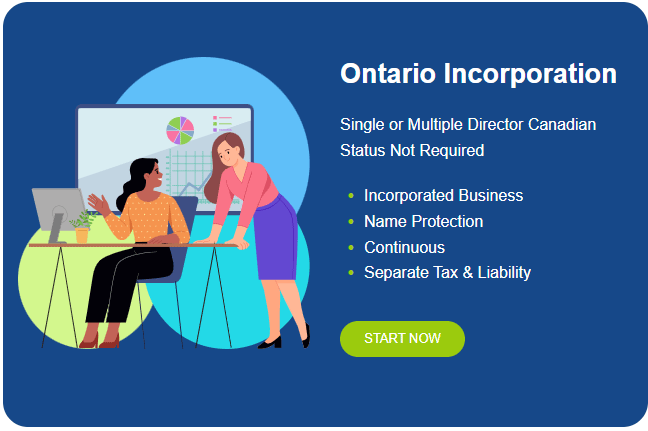How to Become A Canadian Entrepreneur?

Canadian entrepreneurship refers to the activities, culture, and ecosystem surrounding the creation, development, and management of new businesses and startups in Canada. It encompasses a wide range of activities, from identifying business opportunities to securing funding, launching new ventures, and growing businesses in various industries. Here are some key aspects of Canadian entrepreneurship.
How Many Businesses Are There in Canada?
Just the facts!
Currently, there are 1.21 million businesses in Canada.
97.9% are considered small businesses where there are less than 99 employees.
75% of all businesses have less than 4 employees!
The number of service businesses in Canada is 78% and the number of goods producing businesses is 21%.
How Many Businesses Start in Ontario Out of the Overall Businesses in Canada?
A whopping 50% of all businesses in Canada are started in Ontario.
At Ontario Business Central, we have always put businesses starting in Ontario as our primary focus. Start your business with a business that specializes in helping people in Ontario get their business up off the ground. We aren’t here to get you to enroll in something that never ends! Our business is solely to help you get your start up off the ground and to offer you easy access to items you may find helpful!
The chart illustrates the numbers of businesses from each Province and Territory across Canada with the number of businesses, size and individual owners per capita in each jurisdiction.

Chart provided by https://ised-isde.canada.ca/
What Are Your Chances of Your Business Being Here in 5 Years?
You have exceptional odds of your business being successful and still being here in 5 years. The current odds overall for a business still operating in 5 years is 70%.
Here Are Some Key Aspects of Canadian Entrepreneurship
- Diversity: Canada’s entrepreneurship landscape is known for its diversity, with entrepreneurs coming from various cultural, ethnic, and socioeconomic backgrounds. This diversity fosters a rich blend of ideas and innovations.
- Supportive Ecosystem: Canada has a robust ecosystem that supports entrepreneurship, including government programs, incubators, accelerators, business associations, and access to financing. Organizations like Startup Canada, Futurpreneur Canada, and various provincial and regional agencies offer resources and support to entrepreneurs.
- Innovation and Technology: Canadian entrepreneurs often focus on innovation and technology, especially in sectors like information technology, biotechnology, clean energy, and artificial intelligence. Research and development activities are encouraged through government incentives and grants.
- Access to Capital: While Canada has relatively strong access to capital, entrepreneurs often seek financing from various sources, including venture capitalists, angel investors, government grants, and traditional bank loans.
- Small Business Culture: Small and medium-sized enterprises (SMEs) play a vital role in the Canadian economy. Many entrepreneurs start with small businesses and then scale up over time.
- Entrepreneurial Education: Canadian universities and institutions offer entrepreneurship programs and courses to equip aspiring entrepreneurs with the skills and knowledge needed to succeed in business.
- Global Opportunities: Due to Canada’s strong trade relationships and international presence, Canadian entrepreneurs often explore global markets for expansion and partnerships.
- Social and Environmental Entrepreneurship: Canadian entrepreneurs are increasingly focusing on social and environmental issues, integrating sustainability into their business models, and creating social enterprises that aim to make a positive impact on society and the planet.
- Support for Women and Minority Entrepreneurs: Efforts are being made to increase the representation of women and minority entrepreneurs in the Canadian business landscape. Initiatives, networks, and organizations are dedicated to providing support and resources to underrepresented groups.
- Regulatory Environment: Canada offers a stable and business-friendly regulatory environment, making it an attractive place to start and grow a business. However, entrepreneurs must navigate various federal and provincial regulations.
What is Required to Become an Entrepreneur?
- Entrepreneurial Mindset:
- Passion: A strong passion for your business idea or industry is essential, as it will drive your motivation and perseverance.
- Creativity: The ability to think outside the box, innovate, and come up with unique solutions is crucial.
- Risk Tolerance: Entrepreneurs often face uncertainty and risk, so having a tolerance for calculated risks is important.
- Business Idea:
- Identify a viable business idea or opportunity that addresses a specific problem or fulfills a need in the market.
- Research and validate your idea to ensure there is demand and a potential customer base.
- Market Research:
- Conduct thorough market research to understand your target audience, competitors, and industry trends.
- Gather data to make informed decisions about your business strategy.
- Business Plan:
- Develop a comprehensive business plan that outlines your business goals, strategies, financial projections, and marketing plans.
- A well-structured business plan is essential for obtaining funding and guiding your business’s growth.
- Financial Management:
- Have a clear understanding of financial concepts, including budgeting, cash flow management, and profitability analysis.
- Secure adequate funding or capital to start and sustain your business.
- Legal and Regulatory Knowledge:
- Familiarize yourself with the legal requirements for starting and operating a business in your jurisdiction.
- Register your business, obtain necessary licenses, and comply with tax regulations.
- Networking:
- Build a strong network of contacts, mentors, and advisors who can provide guidance, support, and potential partnerships.
- Networking can also help you access resources and opportunities.
- Resilience and Adaptability:
- Expect setbacks and challenges along the way, and be prepared to learn from them and adapt your strategies.
- Resilience is crucial for overcoming obstacles and staying motivated during tough times.
- Marketing and Sales Skills:
- Develop effective marketing and sales strategies to promote your products or services and acquire customers.
- Understand digital marketing, branding, and customer relationship management.
- Time Management:
- Efficiently manage your time and prioritize tasks to maximize productivity and minimize stress.
- Leadership and Team Building:
- As your business grows, you may need to hire and manage employees or work with collaborators.
- Leadership skills and the ability to build and lead a team are essential.
- Continuous Learning:
- Stay updated on industry trends, emerging technologies, and best practices in entrepreneurship.
- Be open to learning from your experiences and seeking new knowledge.
- Customer Focus:
- Always prioritize your customers and their needs. Excellent customer service is crucial for building loyalty and repeat business.
- Adherence to Ethical Standards:
- Conduct your business with integrity and ethical principles. Building trust with customers and partners is essential for long-term success.
- Persistence and Perseverance:
- Entrepreneurship often involves facing rejection and setbacks. Persistence and the ability to keep moving forward despite challenges are critical traits.
Becoming an entrepreneur is a journey that requires continuous learning and adaptation. While these qualities and skills are important, it’s also essential to recognize that every entrepreneur’s path is unique, and there is no one-size-fits-all formula for success. Ultimately, your passion, dedication, and ability to learn from both successes and failures will play a significant role in your entrepreneurial journey.
To you and your business success!
inquiries@ontariobusinesscentral.ca
Toll-Free: 1-800-280-1913
Local: 1-416-599-9009
Fax: 1-866-294-4363
Office Hours: 9:00am – 5:00pm
Monday – Friday E.S.T.
Ontario Business Central Inc. is not a law firm and cannot provide a legal opinion or advice. This information is to assist you in understanding the requirements of registration within the chosen jurisdiction. It is always recommended, when you have legal or accounting questions that you speak to a qualified professional.




